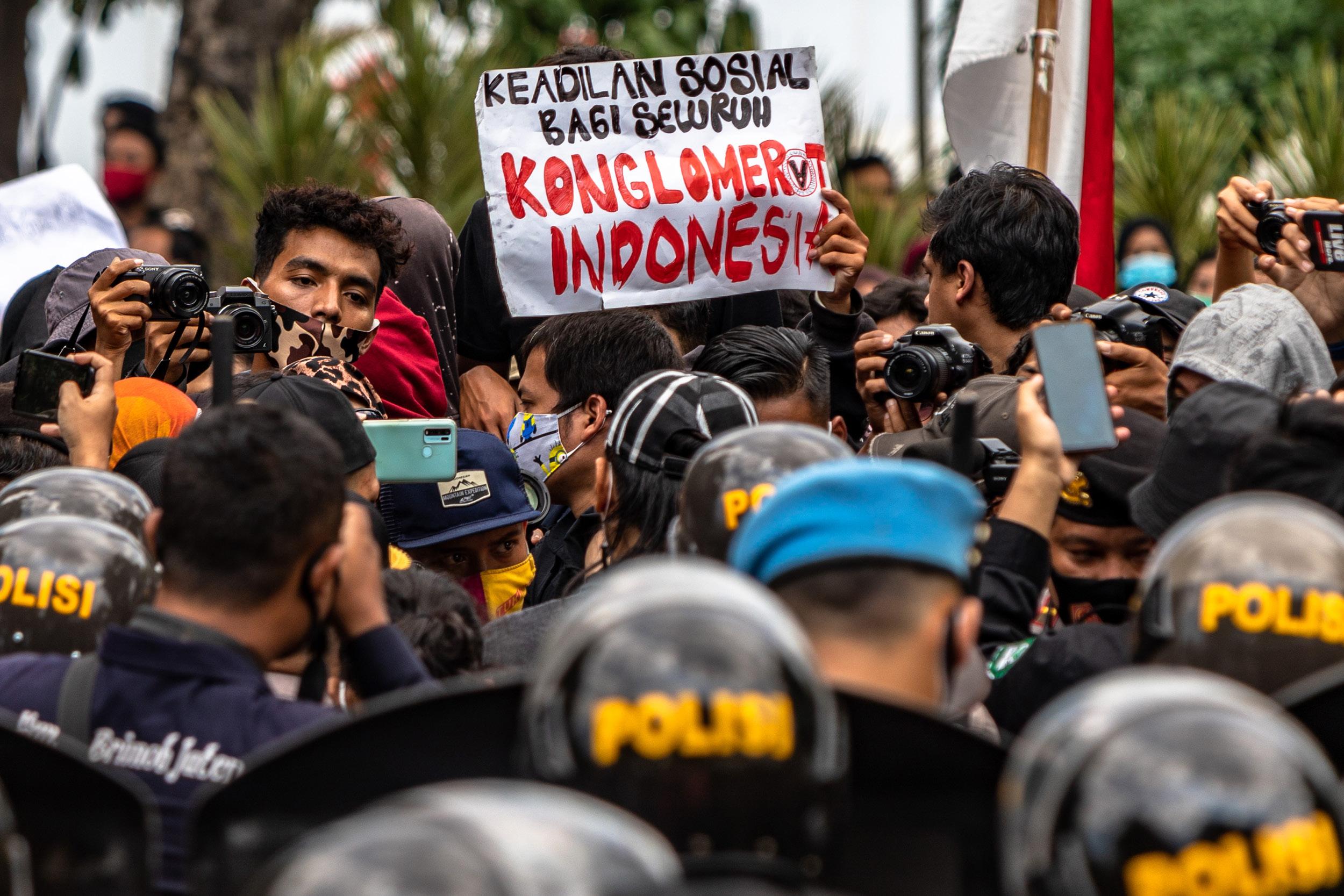
9 minute read
The new Omnibus Law: consolidating oligarchic power
Students hold a protest to reject the Omnibus Law that was already passed by the Indonesian Parliament in front of Central Java Parliament building in Semarang, Central Java. 7 Oct, 2020.
© Aji Styawan / Greenpeace
447 Kompas.com (2019) 448 Mashabi S & Prihatin IU (2019) 449 Idhom AM (2020) 450 Law 11/2020 on Job Creation / Undang-Undang no. 11 tahun 2020 tentang Cipta Kerja, full text available at https://www.setneg.go.id/view/index/ undang_undang_republik_indonesia_nomor_11_tahun_2020_tentang_cipta_kerja
In 2019, President Jokowi announced that he would prioritise a pro-investment deregulatory push, via a new ‘Omnibus Law on Job Creation’.447 In his second term inauguration speech he set out the main thrust of his plan, saying ‘we have to simplify, cut and trim every regulatory obstacle’.448 The resulting Omnibus Bill, running to over a thousand pages and modifying dozens of existing laws, provoked massive demonstrations across Indonesia in October 2020,449 during the final stages of deliberation by the House of Representatives. It became law on 2 November 2020.450
It has been roundly criticised and opposed by a broad spectrum of civil society groups, including environmental organisations, trade unions and religious groups, who claim that it marginalises existing social and environmental safeguards in order to achieve this objective. A frequent accusation has been that it facilitates and consolidates the oligarchic style of business characterised by crossover between political and business interests; the law has even been called the Oligarchy’s Rulebook.451
Among the actors who were involved in conceiving and drafting the bill were national sectoral business associations, representatives from which were included in a 127-strong team known as the Omnibus Law Task Force,452 which included entrepreneurs in sectors which pose a major threat to the environment and Indigenous rights such as mining and plantations.453 Moreover, there are serious conflicts of interest within the House of Representatives in relation to the purpose of the Omnibus Law. A joint media–NGO investigation found that 45% of House members (262) occupy high-level positions or hold financial stakes in companies. According to the investigation their names appear in the company registry records of 1,016 Indonesian companies spanning various sectors.454
It is noteworthy that the apparent weakening of environmental standards and safeguards which the law brings about has provoked criticism from investors who are not part of the national oligarchy, and who view unsustainable practices as increasing investment risk. A group of 36 global investors representing funds worth US$4.1 trillion wrote an open letter, stating that ‘we fear that proposed
changes to the permitting framework, environmental compliance monitoring, public consultation and sanctioning systems will have severe environmental, human rights and labor-related repercussions that introduce significant
uncertainty and could impact the attractiveness of Indonesian markets’.455 The IMF’s mission chief to Indonesia, Thomas Helbling, has also expressed concern, being quoted as saying that ‘The implementing regulation that is now under way should be guided by the need to ensure sustainable and inclusive growth.’456
Thomas Helbling
451 #BersihkanIndonesia & Fraksi Rakyat Indonesia (2020) 452 Established by the Coordinating Minister for Economic Affairs in decision 378/2019 on 9 December 2019. 453 Taher AP (2019) 454 Tempo.co (2019) 455 ACTIAM et al (2020) 456 Akhlas AW (2020)
One of the principal threats to the environment in the Omnibus Law lies in the changes it makes to the permitting process for the plantation sector. Environmental permits have been replaced by a weaker ‘environmental approval’ as part of a wider business permit. Requirements for environmental impact assessment (EIA) have been weakened – notably by removing the explicit right of stakeholders to raise objections. Regional EIA evaluation commissions, which under the Environment Law had to include local community representatives, environmentalists, and environmental experts,457 are to be abolished, with their function to be taken over by central government.

In addition to its changes to the structure and requirements of the permitting regime, the Omnibus Law has taken much of the decision-making power around permits away from local governments and centralised it in Jakarta.458 Although local governments will retain some involvement in the administrative procedures required to issue new permits, their role may be reduced to rubber-stamping as they will have less discretion to refuse permits which meet the norms, standards, procedures and criteria (NSPK) determined by central government but which would be unpopular locally.459 This power grab by Jakarta is a highly political act, as it is a reversal of key democratic reforms which were implemented after the end of the Soeharto dictatorship. In particular, the Omnibus Law contains no special provisions acknowledging the laws granting special autonomy status to Papua and Aceh, which, despite their shortcomings, were intended as attempts at peacekeeping after protracted conflicts. In practical terms, this could hamper efforts by local and provincial governments in Papua to pursue development strategies that protect the rights of Indigenous communities, if these strategies conflicted with central government priorities – including Papua Barat Province’s initiative to establish itself as a conservation province,460 aiming to set aside 70% of its land area for conservation.461
Centralisation of power may also have the effect of exacerbating corruption and oligarchic control. As the analysis and case studies in this report show, under the current model of governance, ambiguities in legislation, poor integration of legislation concerning different types of permits and a lack of transparency combine to allow irregular, unprocedural or illegal permits to be issued and remain valid, with few legal avenues being available to challenge or revoke them. This state of affairs tends to encourage a mode of enterprise founded on political cronyism. Although the Indonesian Government has argued that the Omnibus Law will help to prevent corruption in permitting at the local and provincial level,462 the evidence presented in this report demonstrates that there is no reason to assume that corruption risk is lower at the national level than at the provincial or local level. Indeed, Transparency International Indonesia has raised concerns that the new law would not fix the underlying causes of corruption, but simply shift corruption from the regions to the centre.463
457 See clause 30 of Law 32/2009 on Protection and Management of the Environment / Undang-Undang no. 32 tahun 2009 tentang Perlindungan dan Pengelolaan Lingkungan Hidup (full text available at https://jdih.esdm.go.id/storage/document/UU%2032%20Tahun%202009%20(PPLH).pdf). 458 Wahyuningroem SL (2020) 459 Komite Pemantauan Pelaksanaan Otonomi Daerah (2020) 460 Hafsyah SS (2020) 461 Hariandja RY (2018) 462 Al-Qodariah F (2020) 463 Transparency International Indonesia (2020)
This risk appears to be exacerbated by provisions in the Omnibus Law that amount to a massive transfer of power at national level from the legislature to the executive. Research by the Indonesian Center for Environmental Law (ICEL) has pointed out that many fundamental clauses that had previously been included in laws approved by the House of Representatives have been erased, with their replacements to be contained in new regulations that will be drawn up by the executive branch of central government.464 In February 2021, 49 Government Regulations and Presidential Regulations were issued to implement the Omnibus Law.465 Prior to this ICEL had calculated that 454 new Government Regulations were mandated by the Omnibus Law,466 while the Indonesian Center for Law and Policy Studies (PSHK) put the number at 516;467 in any case most are not yet written, suggesting the likelihood of legislative chaos for years to come. There is a real risk that the lack of legal clarity this generates, or the contents of the new regulations themselves, may render the permit system even more susceptible to corrupt oligarchical control by a national elite. ICEL has also pointed out inconsistencies in the mammoth document itself, which will have the effect of introducing new ambiguities into Indonesia’s legal system.
The Omnibus Law has also extinguished the principle of strict liability for environmental damage and fires on land controlled by companies.468 This has removed a key plank in the forest fire prevention regime, which relied on companies being held accountable through the courts.
As well as reforms to laws concerning the licensing and governance of business activities, the Omnibus Law mandates the creation of new central government agencies, including a Land Bank which will build up (by means not fully specified) a reserve of land to be used for a variety of purposes such as agrarian reform and any other projects deemed to be in the national interest.469 This Land Bank will have the authority to distribute land, though the procedures by which it will do so are not stipulated. It will be overseen by a Board of Supervisors consisting of three members chosen by central government and four members from professional backgrounds. The potential for corruption is clear, as is the danger that central government may use the Land Bank to impose development projects on unwilling regions.

464 ICEL (2020b) 465 Farisa FC (2021) 466 ICEL (2020b) 467 Putra A (2020) 468 Greenpeace Indonesia (2019) 469 The Indonesian Government conceives agrarian reform not in terms of the redistribution of large landholdings to poor farmers, but rather as a process of identifying unallocated land to be used for agriculture. In West Papua, many of the areas being evaluated for agrarian reform are forested areas.
Minister for Agrarian Affairs and Spatial Planning Sofyan Djalil has attempted to provide reassurances about the Land Bank, reportedly saying that its purpose is to focus on abandoned land, and that Indigenous land will not be not considered to be abandoned.470 However, the Omnibus Law does not include any specific safeguards for Indigenous or community land. It specifies only one mechanism by which the Land Bank may acquire assets, namely by taking over concessions that have been revoked after being inactive for two years – such cases would be a cause for concern if companies had claimed to have ‘released’ the land from Indigenous owners, since this process rarely if ever meets standards for FPIC. It is unclear whether the Land Bank may also be intended to acquire land through other mechanisms. The Omnibus Law introduces a new term, hak pengelolaan (management rights), which is not included in the 1960 Basic Agrarian Law and is likely to lead to legal confusion.471
In drafting the Omnibus Law, the government has missed an opportunity to make fundamental changes in natural resource governance, particularly in the plantation sector. Overhauling the permitting system could have been an opportunity to put in place strong legal protection for Indigenous rights, and to legislate for FPIC at all stages of the permitting process and as part of spatial planning reviews. Environmental legislation could have been strengthened so that EIAs became authoritative documents that could ensure that projects went ahead only when they met the highest social and environmental standards. Proper transparency legislation could have been introduced, such as mandatory online disclosure of documents relating to permit decisions, thereby ensuring that provincial and local governments could be held to account more effectively than has been the case and corruption risk minimised without the need for recentralising power.
Far from strengthening environmental protection and governance in the natural resources sector, the Omnibus Law is a disaster. The many loopholes and weaknesses introduced by the new law will worsen natural resource management, including in the plantation industry. Indigenous rights will continue to be sidelined, while the EIA process looks likely to become even less effective as a safeguard against environmentally destructive projects. Meanwhile the law’s centralisation of power over the permitting process, and its provisions for wideranging replacement of legislation by executive regulation, may well exacerbate the corruption and cronyism that characterise the plantation sector, even if they shift the focus of corruption from a local to a national level.
470 Novika S (2020) 471 Yuliawati O (2020)






